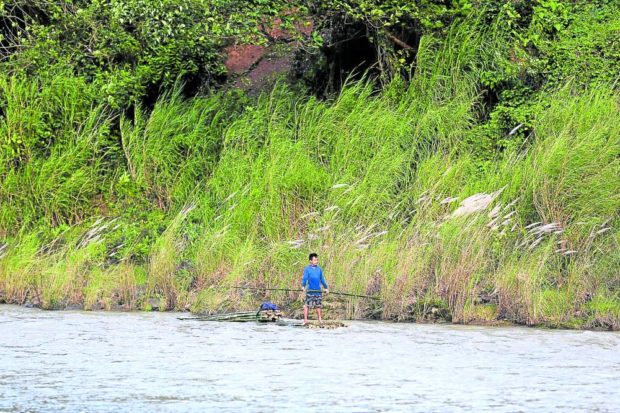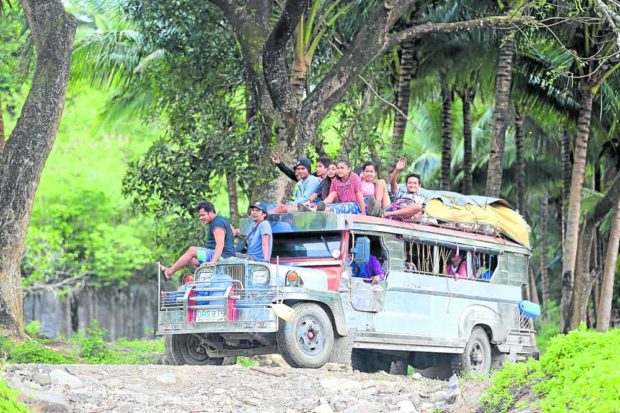No haste in Kaliwa Dam consultations – MWSS

KALIWA RIVER/ DEC. 29, 2021: Locals use the Kaliwa River in Tanay Rizal to transport bamboo. The construction of the P12.2-billion Chinese-funded Kaliwa Dam will be built across the ancestral land of the Dumagat-Remontado communities in Rizal and Quezon. (File photo by REM ZAMORA / Philippine Daily Inquirer)
MANILA, Philippines — The Metropolitan Waterworks and Sewerage System (MWSS) has denied that it had railroaded the consultation process for the construction of the P12.2-billion, Chinese-funded Kaliwa Dam, which will be built on the ancestral land of the Dumagat-Remontado communities in Rizal and Quezon provinces.
This after several indigenous peoples (IP) leaders and elders of three Dumagat communities in Yokyok, Baykuran and Makidata slammed the MWSS and the National Commission on Indigenous Peoples (NCIP) for signing a memorandum of agreement (MOA) on the New Centennial Water Source-Kaliwa Dam Project project even though only select tribal leaders were allowed to participate in the negotiations.
The MOA is part of securing the tribes’ free, prior and informed consent (FPIC) before the government can build Kaliwa Dam, since it encroaches on their ancestral domain.
Once signed, the NCIP will review the FPIC report before it can declare the process complete.
Kaliwa is intended to supply 600 million liters of water to Metro Manila and nearby areas that currently depend on Angat and Ipo dams in Bulacan province.
Article continues after this advertisementHealth concerns
During the first meeting on Jan. 24, more than 100 tribe members attended the event held at a public high school and an elementary school, both in General Nakar, Quezon, with some connected via Zoom, according to Conchita Calzado, one of the Dumagat leaders invited to the assembly.
Article continues after this advertisement“They told us they wanted to split us because of COVID-19,” Calzado said. “But if their concern was really COVID [infection], they should not have pushed through with the assembly at all.”
In a statement sent to the Inquirer, Jonathan Lamug, the MWSS division manager for Umiray operations, confirmed that they had separated the tribe members into two groups, but only because most of them refused to undergo antigen tests.
Because of the way the program was set up, many of the tribespeople did not understand the discussions, and internet signal was poor in their areas, she added.
Rodrigo Piston, the mandatory representative for Baykuran, Yokyok, Makidata and Queborosa, said the tribe was not informed of the need to be vaccinated or tested before the negotiations, “and even so, we went against our will because, at the time, our communities were under alert level 3.”
Despite all this, by Jan. 28, or four days into the negotiations, the MOA was already signed.

MORE SEATS: In this photo taken in December last year, residents of Daraitan in Tanay, Rizal, travel on “topload,” or on top of the roof of a jeepney, so more cargoes and passengers can fit into the few public vehicles servicing their remote community. The Kaliwa Dam will be built on tribal land in the Sierra Madre mountains that will include parts of Daraitan. (File photo by REM ZAMORA / Philippine Daily Inquirer)
Tribal leaders who were able to enter the session halls had told Piston that they were forced to sign the MOA and that they were not even given a copy of the document.
‘Under protest’
In an earlier telephone interview, Agta chieftain Ramcy Astoveza described the MOA as “highly questionable,” noting that the process was tainted with “deception.”
“Two of us signed the MOA but we marked it ‘under protest.’ We demanded that the discussion be held at the affected tribal communities when there is no more threat from COVID-19,” Astoveza said. The other Agta leader who signed the document with reservation was Melecio Rutaquio.
Astoveza said he could choose not to sign the agreement but he decided to affix his signature so he could register his protest.
He claimed the rest of the signatories were representatives from tribal communities unaffected by the project.
“Their communities will not be inundated [with water] once the dam operates. They are outside of the target dam area,” Astoveza said.
Lamug, however, maintained that they had fully complied with the FPIC process.
“The proponent MWSS recognizes the need to hear inputs, reservations, if any, of all sectors, which is what the FPIC is all about. All the issues were addressed which led to the signing of the MOA,” he said.
‘Last resort’
“While it took considerable time for the FPIC MOA negotiations to be concluded, and eventually for the document to be signed by the parties, [this only] speaks of the proponent’s regular adherence to the FPIC process and its respect for the right of every sector to be represented and heard,” he added.President Duterte has called the project the “last resort” for Metro Manila’s dwindling water supply.
Astoveza said “the dam project is a matter of life and death for us.”
“Once we allow the dam inside our natural habitat, what would follow is the death of our tribe,” Astoveza said in an earlier interview.
The project would submerge parts of the Sierra Madre in Tanay town, Rizal; and General Nakar and Infanta towns in Quezon. The dam is expected to flood a watershed area of 9,700 hectares and affect 1,465 families, according to studies conducted by Save Sierra Madre Network Alliance.
READ: Construction of Kaliwa Dam pushed through even without permits — COA